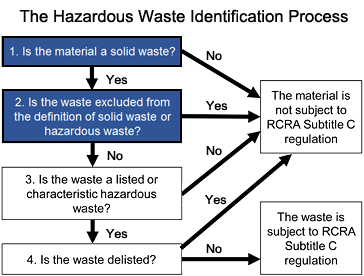Reclaim Waste Can Be Fun For Everyone
Reclaim Waste Can Be Fun For Everyone
Blog Article
Things about Reclaim Waste
Table of ContentsThe smart Trick of Reclaim Waste That Nobody is Talking AboutReclaim Waste Fundamentals ExplainedAll about Reclaim WasteNot known Details About Reclaim Waste 4 Easy Facts About Reclaim Waste Shown
Explore the types, events, and types of liquid waste. Domestic sewage waste describes the waste and products from a domestic sewage-disposal tank. This sort of waste is produced by human beings in homes, schools, and various other structures. This only consists of sewage-disposal tanks that have a drainpipe area. The correct monitoring and disposal of residential sewer waste need fluid waste to be transferred to a sewer treatment plant where the correct techniques and equipment are related to purify and get rid of waste.
Industrial waste often consists of potential dangers, such as combustible products or a combination of liquid and strong waste products, and needs an extra advanced and thorough disposal procedure. The disposal of commercial waste commonly involves the filtering of waste prior to transport to ensure safe and appropriate disposal. Hazardous waste is developed from byproducts and runoff of commercial procedures and manufacturing.
This sort of waste can not use the same sewage monitoring transportation or procedures as septic or industrial fluids. The hazardous waste monitoring process requires the evaluation and testing of fluid waste prior to it undertakes the disposal procedure (liquid waste removal melbourne). Drainage waste is the fluid waste that comes from overflow and excess stormwater in extremely inhabited locations or cities
Drainage waste can create contamination and flooding otherwise handled correctly. Find out more concerning sewer cleaning and waste monitoring. Making sure correct waste administration can protect against calamities and minimize environmental damage. Both individuals in residential settings and professionals in commercial or manufacturing markets can gain from comprehending the processes and guidelines of liquid waste management.
A Biased View of Reclaim Waste
Contact PROS Solutions today to learn regarding our waste monitoring and disposal services and the proper means to care for the liquid waste you generate.
(https://www.mixcloud.com/reclaimwaste1/)Do you understand what occurs to your water when you end, purge the toilet or drain pipes the cleaning machine? No? Well, it deserves knowing. This so-called 'wastewater' is not only a crucial source however, after treatment, will be launched to our land, rivers or the sea. Utilized water from commodes, showers, baths, kitchen sinks, laundries and industrial processes is known as wastewater.

water utilized to cool machinery or tidy plant and equipment). Stormwater, a type of wastewater, is runoff that streams from farming and urban locations such as roofings, parks, yards, roads, courses and seamless gutters into stormwater drains pipes, after rainfall. Stormwater flows untreated straight to neighborhood creeks or rivers, eventually getting to the ocean.
Reclaim Waste Fundamentals Explained
In Queensland, a lot of wastewater is treated at sewage treatment plants. Wastewater is delivered from residential or commercial sites with a system of sewage systems and pump terminals, known as sewage reticulation, to a sewage treatment plant. Neighborhood governments build, maintain and run most sewer treatment plants. Operators are licensed under the Environmental Management Act 1994 to discharge cured wastewater at an appropriate environmental requirement into waterways.
The Division of Natural Resources encourages local federal governments concerning managing, operating and preserving sewerage systems and treatment plants. In unsewered locations, city governments may require householders to mount individual or household sewer therapy systems to deal with residential wastewater from commodes, cooking areas, washrooms and laundries. The Division of Natural Resources authorises the usage of family systems when they are shown to be reliable.
In some new neighborhoods, therapy of some stormwater to eliminate litter, sand and gravel has actually begun making use of gross pollutant catches. Wastewater treatment happens in 4 stages: Removes solid issue.
Wastewater after that flows into large tanks where solids resolve and are gotten rid of as sludge. Grease and scum are skimmed why not look here from the surface area. Utilizes tiny living organisms called micro-organisms to break down and get rid of continuing to be dissolved wastes and fine particles. Micro-organisms and wastes are integrated in the sludge. Gets rid of nitrogen and phosphorus nutrients that can cause algal blooms in our waterways and endanger marine life.
The Definitive Guide to Reclaim Waste
Nutrient removal is not offered at all sewer therapy plants due to the fact that it calls for expensive specialised tools. Clear fluid effluent produced after therapy might still have disease-causing micro-organisms - liquid waste removal melbourne.

Many wastewater moves into the sewage system. Under the Act, neighborhood federal governments carry out approvals and licences for eco pertinent tasks (Ages) including wastewater launches that could have a local effect.
Some Known Details About Reclaim Waste
Otherwise, samples are taken for research laboratory analysis. Often lots of tests are required to establish the levels of each of the various toxins such as oils, heavy metals and pesticides in water. Monitoring supplies factual details concerning water quality and can verify that licence problems are being fulfilled. The details gotten through surveillance provides the basis for making water high quality choices.
Report this page